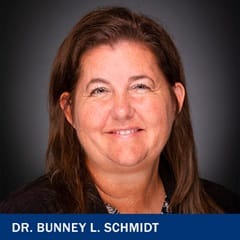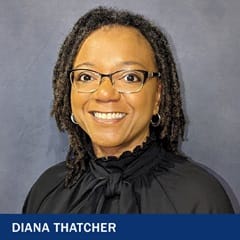10 Jobs in Finance and Accounting to Consider

Understanding the numbers
When reviewing job growth and salary information, it’s important to remember that actual numbers can vary due to many different factors—like years of experience in the role, industry of employment, geographic location, worker skill and economic conditions. Cited projections are based on Bureau of Labor Statistics data, not on SNHU graduate outcomes, and do not guarantee actual salary or job growth.
So, you’re thinking about a career in finance and accounting.
Nothing captures your attention like a problem that needs to be solved. Maybe you’re good with numbers and recalling rules — and you’re ready to dive head-first into spreadsheets and other documents. You can find a story behind every number, and maybe — just maybe — you’ve discovered that the secret to success is financial literacy.
If any of this sounds like you, there’s a wide range of jobs in finance and accounting for you to explore.
What is the Job of Finance and Accounting?
While there are many differences between finance and accounting, both business functions support the financial aspects of businesses and individuals.
Accountants, the U.S. Bureau of Labor Statistics (BLS) said, are primarily focused on preparing and reviewing financial records. Those in finance roles are often future-focused and involved in planning and decision-making, according to BLS.
The terms certainly aren’t interchangeable, but it’s possible to work alongside people with either background — or even both.

At Southern New Hampshire University (SNHU), for instance, you have three bachelor’s degree options if you want to study the subjects. You could earn a bachelor’s in accounting, a bachelor’s in finance — or a combined bachelor’s in accounting and finance.
No matter which direction you take your career, no two days will be the same, according to Dr. Bunney L. Schmidt, CPA, an accounting instructor at Southern New Hampshire University (SNHU).
“There are always things to research and to look closely at and investigate,” she said. “Finding problems and fixing them can be a very satisfying part of the job also.”
You can take a job in finance and accounting in many directions and support all kinds of industries, organizations and individuals.
What Are Some Careers in Finance?
Something Dr. George Mwangi, MBA, CPA, CFA, CMA, a finance instructor at SNHU, loves most about the finance field is its abundance of opportunities. For example, you could pursue roles such as:
- Billing clerk: As a billing clerk, you would oversee any and all data related to billing and prepare invoices, according to O*NET OnLine.
- Financial advisor: Financial advisors counsel clients on their finances and plan for mortgages, investments, retirement — and everything in between, BLS said. Learn how to become a financial advisor.
- Financial analyst: Study trends and evaluate past and present data as a financial analyst to make investment recommendations for organizations and individuals, according to BLS. Discover how to become a financial analyst.
- Personal banker: Also known as a new accounts clerk, personal bankers are relationship-builders at heart. According to O*NET, they assist people interested in opening financial accounts.
- Risk analyst: Measure risks related to an organization’s financial success, from new legislation to environmental impact, market events and more, O*NET said.
But you can also explore accounting roles and management positions with a degree in finance, according to Mwangi — or take the knowledge into other areas of business, like human resources or entrepreneurship.

With so many roles available in finance, there is one shared mission.
“The common overarching goals that financial professionals work towards are financial efficiency and stability for the organization,” said Diana Thatcher, MBA, MEd, a finance instructor at SNHU.
According to Thatcher, who has a wealth of experience in corporate finance and financial planning, maintaining organizational stability involves:
- Mitigating risks
- Ensuring compliance and ethics
- Supporting economic growth
Find Your Program
What Are the Career Opportunities in Accounting?
With the help of a degree, you can find success in a range of accounting careers. You might consider job titles such as:
- Bookkeeper: Maintain financial records, including transactions, debits and credits, and produce statements as a bookkeeper, according to BLS. Learn more about what bookkeepers do.
- Forensic accountant: Forensic accountants fight financial fraud by gathering evidence and testifying, as well as participating in fraud detection and prevention, according to O*NET. Find out how to become a forensic accountant.
- Internal auditor: Focused on improving processes that impact finances, internal auditors verify that their organizations are correctly managing funds and risks, BLS said.
- Management accountant: With a focus on management accounting, you could help businesses make educated decisions with accounting and finance in mind, according to BLS. Learn more about what management accounting is.
- Public accountant: Sometimes certified, public accountants work with clients on a range of tasks, including accounting, auditing, tax and consulting, BLS said. Explore how to become an accountant.
With experience, Schmidt said you can also work toward leadership positions, such as controller or chief financial officer.
No matter the role you pursue, you’ll be working toward a singular goal, according to Schmidt: accurate and transparent reporting.

Is Finance and Accounting a Good Degree?
Yes — a degree is often required if you want to work in finance and accounting, according to BLS. It’s important to research the career that interests you to determine the type of degree, specialization and/or certification can help you get there.
For instance, you could earn an associate degree in finance to prepare for entry-level roles, such as a billing clerk or personal banker, according to O*NET.
If you decide you like finance and want to advance in the field, you may choose to transfer your associate degree credits into a bachelor's in finance program. When you earn your degree online, you’ll also have the flexibility to take your classes with you — a big benefit of SNHU’s new online associate degree in finance, according to Mwangi.
“Most adjuncts are also professionals in their fields, and this is helpful for the learners as they share real-life experiences with students,” he said. For instance, Mwangi has worked in finance for more than 20 years, bringing first-hand experience in banking, consulting, corporate debt financing and entrepreneurship into the classroom.
In addition to picking a degree level, you’ll have the opportunity to specialize in an area of your choice. Some degree concentrations in accounting and finance include:
- Corporate finance
- Financial planning
- Forensic accounting and fraud examination
- Investments
- Management accounting
If you’re not sure which program or career path is right for you, Schmidt, who specializes in taxes, recommends exploring your options through courses. “The only way I really knew was doing a little bit of everything, and then I found the right fit and never questioned it,” she said.
It was through tax courses that she discovered her interest, and she said having a specialty allows her to focus on one area and do it well. “I'm a tax person, so I spend most of my time following what is happening (in) this area that will directly impact our bottom line,” Schmidt said.
Whichever direction you take your degree and career, know that the job outlook for the field is positive.* Business and financial jobs are expected to grow faster than the average for all occupations through 2032, with approximately 911,400 openings each year.*
Job stability is another benefit of working in finance and accounting, according to both Thatcher and Schmidt.
“Finance is an essential function in any economy, providing some level of stability and job security, and many financial roles that are less susceptible to economic downturns,” Thatcher said.
Even when the COVID-19 pandemic disrupted workforces worldwide, Schmidt felt stability in accounting and finance. “So many industries couldn't get by, but it barely impacted our profession at all,” she said. “(We) just had to get creative with tasks like audits.”
Rebecca LeBoeuf Blanchette '18 '22G is a writer at Southern New Hampshire University, where she fulfills her love of learning daily through conversations with professionals across a range of fields. She earned her Bachelor of Arts in Communication with a minor in Professional Writing from SNHU’s campus in Manchester, New Hampshire, and followed her love of storytelling into the online Master of Arts in English and Creative Writing at SNHU. Connect with her on LinkedIn.
Explore more content like this article

For Jazzmen Shipp, Earning a Degree Changed Everything

How Kellsie Goodhart-Jones Earned an MBA While Working for the US Air Force

What Jobs Can You Get with a Business Degree?
About Southern New Hampshire University

SNHU is a nonprofit, accredited university with a mission to make high-quality education more accessible and affordable for everyone.
Founded in 1932, and online since 1995, we’ve helped countless students reach their goals with flexible, career-focused programs. Our 300-acre campus in Manchester, NH is home to over 3,000 students, and we serve over 135,000 students online. Visit our about SNHU page to learn more about our mission, accreditations, leadership team, national recognitions and awards.


